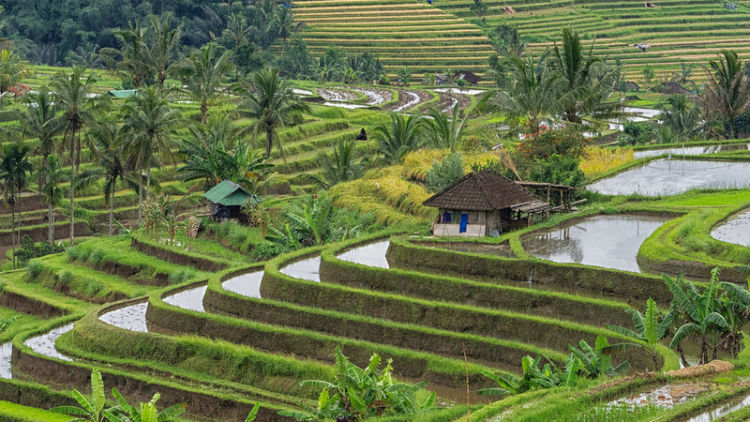Subak Water System with Local Wisdom Water Management Options at WWF Bali
Indonesia introduced local wisdom in water resources management at the 10th World Water Forum (WWF). One of the local wisdoms in water management is Subak in Bali.
Subak is an organization owned by the farming community in Bali which specifically regulates the management or irrigation system of traditional rice fields. Subak is not only an irrigation system, but also reflects the local philosophy and wisdom of the Balinese people which is passed down from generation to generation.
The water crisis has become one of the biggest challenges facing the world today. In recent decades, we have witnessed an increase in disproportionate water consumption, water pollution, climate change, and damage to water ecosystems that affect the sustainability of our water resources.
Regarding this matter, the Director General of Culture of the Ministry of Education, Culture, Research and Technology (Kemendikbudristek), Hilmar Farid, said that Indonesia has an option that comes from domestic culture so that people in the downstream can feel the benefits of sustainable water management in the upstream and provide support. to downstream communities.
In fact, the solidarity system that was built, if projected in the present, with the support of modern science and technology, might be able to answer some of the problems of wise and sustainable water management. It is hoped that local wisdom in Bali can color policy regarding water at the global level at the World Water Forum (WWF). this 10th.
The 10th WWF which is being held in Bali is a strong collaborative effort to overcome the challenges of climate change and strengthen political consensus at the local, national and international levels amidst uncertain climate conditions throughout the world.
The High Level Meeting held at the 10th WWF in Bali was a meeting with those responsible for political, thematic and regional processes as well as a bilateral meeting of several heads of state regarding water issues. Starting from discussing the world water budget, water diplomacy and peace to the world observatory for non-conventional water resources and renewable energy which will later be able to formulate a resolution policy for world water management.
Head of BMKG, Dwikorita Karnawati said that based on the results of many analyzes by world climate institutions, current climate and weather conditions continue to experience uncertainty, one of which is due to the uncontrolled release of the greenhouse gas CO2 in the atmosphere.
This condition of uncertainty results in the emergence of extreme weather; both drought and rain above the normal average, the impact of which not only opens up opportunities for social and public health degradation but also affects the financial or economic conditions of a country.
One of the important substances of WWF in Bali is for Indonesia as the host or other delegates to jointly formulate ideas or commitments that can become a consensus to overcome water management problems and the impacts caused by current climate conditions.
Dwikorita assessed that this binding consensus is the most important point that will be produced by the 10th WWF, because it means that the heads of participating countries agree to execute all action plans that have been prepared scientifically based on ecosystems and natural events by their respective countries.
The real action plan concerns climate change mitigation and eliminating the gap between the challenges and capacities of each country in terms of managing water resources, climate, food, energy and health.
BMKG said that increasing greenhouse gas emissions were the main cause of the water crisis. This has an impact on increasing the rate of air temperature which results in global warming which continues to have an impact on the phenomenon of climate change.
This climate change will trigger various crises, such as water, food and even energy crises. In addition, the frequency, intensity and duration of hydrometeorological disasters has also increased. If left unchecked, the BMKG said that the water crisis will have other impacts, namely a food crisis, an energy crisis and a social crisis. According to the World Meteorological Organization (WMO) report, various extreme crises have occurred in various parts of the world.
Therefore, systematic mitigation and adaptation to water-related issues is very necessary. This is done through observation, monitoring and data collection. The data that has been collected will later become the basis for stakeholders to formulate policies regarding the water crisis. This data can also be a reference for mitigating before a disaster strikes.
There are several steps that can be taken as part of mitigating the water crisis, including the following. First, save water. One simple step that can be taken is not to waste water usage. We can turn off the faucet or water pipe when it is not in use. Apart from that, use water that can be reused, for example rice washing water to water plants.
Furthermore, do not throw rubbish in waterways. Throwing rubbish in waterways has an impact on poor water quality. So, the water obtained is not clean. Therefore, throwing away rubbish in the right place is a wise step to overcome this problem.
Then, carry out reforestation. In this case, trees have an important role in mitigating the water crisis. The roots function to absorb water into the soil. The more trees planted, the greater the water reserves stored will be. Lastly, create a rain shelter. Apart from reforestation, collecting rainwater can be another alternative. Building rainwater reservoirs is one solution to increase water availability. Moreover, this is also a step to prevent a water crisis.
